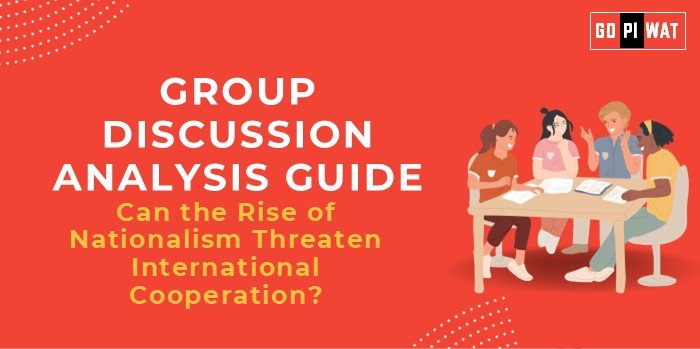📋 Group Discussion (GD) Analysis Guide
🌟 Can the Rise of Nationalism Threaten International Cooperation?
🌐 Introduction to the Topic
Opening Context: Nationalism, with its emphasis on prioritizing domestic interests and sovereignty, has resurged in recent years across the globe. This rise poses challenges to international cooperation in addressing global issues like climate change, economic interdependence, and human rights.
Topic Background: Nationalism, historically linked to sovereignty and cultural identity, has often served as a counterbalance to globalization. However, excessive nationalism can undermine collective efforts on international treaties, trade agreements, and peace-building measures. From Brexit to America’s “America First” policy, the impacts are evident.
📊 Quick Facts and Key Statistics
- 🌍 Global Rise in Nationalism: Over 20 countries have elected nationalist governments since 2015, reflecting a global trend toward inward-focused policies.
- 📜 International Treaties at Risk: Withdrawal from agreements like the Paris Accord (2017) and WTO disputes shows nationalism’s impact on global cooperation.
- 🧳 Refugee Statistics: Over 35 million refugees globally face challenges as nations tighten immigration policies under nationalist agendas.
- 📉 Global Trade Impact: Nationalist policies contributed to a decline in global trade growth from 3.5% in 2018 to 2.9% in 2023 (World Bank).
👥 Stakeholders and Their Roles
- 🏛️ Governments: Implement nationalist policies and determine international treaty adherence.
- 🌐 International Organizations: UN and WTO strive to mediate and sustain cooperation amidst nationalist pressures.
- 🏢 Corporations: Adapt to shifts in international trade and policy frameworks influenced by nationalism.
- 🤝 Civil Society: Advocates for balanced approaches that respect both nationalism and internationalism.
🏆 Achievements and Challenges
- 🎯 Achievements:
- Strengthening National Identity: Nationalist movements often reinforce cultural and historical pride.
- Economic Prioritization: Policies like tariffs and domestic job programs have bolstered local industries in some countries.
- ⚠️ Challenges:
- Undermining Multilateralism: Nationalist stances hinder global initiatives, like the failure of the Doha Round of WTO negotiations.
- Diplomatic Strains: Struggles in addressing transnational issues, e.g., vaccine distribution during COVID-19.
🌍 Global Comparisons
- 🌟 Brexit: Exemplifies nationalism challenging cooperative frameworks like the EU.
- 📜 China’s Belt and Road Initiative (BRI): Nationalist critiques from recipient nations disrupt cooperation.
Case Studies:
- 🌱 Paris Accord Withdrawal: The U.S.’s brief exit under nationalism-driven policies highlighted risks to climate cooperation.
- 🇮🇳 India and Trade Tariffs: Balancing nationalist policies with WTO obligations demonstrates complex trade-offs.
📋 Structured Arguments for Discussion
- ✔️ Supporting Stance: “Nationalism’s focus on sovereignty often weakens the frameworks needed for effective global cooperation.”
- ❌ Opposing Stance: “Nationalism can coexist with internationalism, as nations can prioritize domestic welfare while participating in global efforts.”
- ⚖️ Balanced Perspective: “The rise of nationalism poses challenges but also opportunities to reshape international cooperation for mutual benefit.”
🛠️ Effective Discussion Approaches
- 🔍 Opening Approaches:
- “Over 20 nationalist governments elected globally since 2015 indicate a clear trend impacting global treaties.”
- Use examples like Brexit or U.S. trade wars to set the context.
- 💬 Counter-Argument Handling:
- Counter the notion that nationalism always harms cooperation by citing instances where domestic priorities complemented global goals, like India’s vaccine diplomacy.
📈 Strategic Analysis of Strengths and Weaknesses
- 🟢 Strengths:
- Preserves cultural identity.
- Focuses on domestic challenges.
- 🟡 Weaknesses:
- Undermines trust and cooperation.
- 🔵 Opportunities:
- Develop balanced policies respecting sovereignty while maintaining global ties.
- 🔴 Threats:
- Escalation of trade wars.
- Withdrawal from treaties.
📚 Connecting with B-School Applications
- 🌏 Real-World Applications: Analyze the impact of nationalism on multinational corporations’ strategies, such as navigating tariffs or adapting supply chains.
- 🤔 Sample Interview Questions:
- “How can multinational companies operate effectively amid rising nationalism?”
- “Evaluate the trade-offs between sovereignty and global cooperation.”
- 💡 Insights for Students:
- Understanding nationalism is crucial for addressing global challenges in supply chain management and policy alignment.


